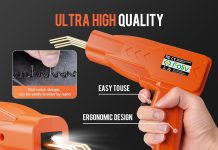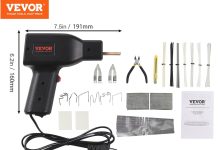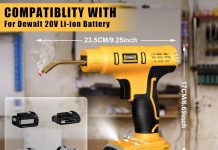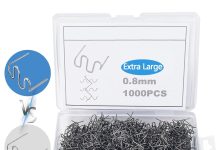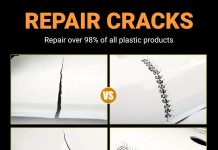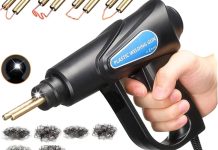Flux-cored arc welding is a widely used welding process that offers numerous advantages over other methods. In this article, we will explore the benefits of using flux-cored arc welding and how it can contribute to efficient and high-quality welding operations. Whether you are a professional welder or a hobbyist, understanding the advantages of this technique can greatly enhance your welding skills and improve the quality of your welds. So, let’s explore the world of flux-cored arc welding and discover why it has become a preferred choice among welding enthusiasts and professionals alike.
Review contents
Increased Welding Speed
Flux-cored arc welding (FCAW) offers numerous advantages that contribute to increased welding speed. One of the key factors is the high deposition rate that can be achieved with this welding process. FCAW allows for greater metal deposition per unit of time compared to other welding methods, enabling welders to complete projects more quickly.
Additionally, FCAW is known for its smooth and stable arc, which reduces the time spent on correcting errors or inconsistencies in the welding process. The reliability and consistency of the arc result in faster welding speeds, minimizing the time needed for each weld and increasing overall productivity.
Versatility
Suitable for Various Materials
One of the significant advantages of FCAW is its versatility in welding various materials. It can be used for both mild and high-strength steels, stainless steels, and even some non-ferrous materials. This versatility makes FCAW a practical option for a wide range of applications, from structural welding to fabrication projects.
Whether you’re working with carbon steel, stainless steel, or aluminum, FCAW offers excellent penetration and fusion, producing strong and durable welds. This adaptability makes FCAW a go-to choice for welders in diverse industries.
Different Joint Configurations
Another aspect that highlights the versatility of FCAW is its suitability for different joint configurations. Unlike some other welding processes, FCAW can be utilized for various joint designs, such as butt joints, lap joints, fillet joints, and T-joints. This flexibility allows welders to tackle welding projects with different requirements and specifications, without the need to switch to alternative welding methods.
Deep Penetration
One of the key advantages of FCAW is its ability to achieve deep penetration. This means that the weld can reach deep into the base material, ensuring a strong bond throughout the joint. Deep penetration is crucial for welds that need to withstand high stress or pressure.
The combination of high welding speed and deep penetration makes FCAW an efficient option for projects that demand strong and reliable welds. By achieving deep penetration, FCAW helps welders meet the quality and strength requirements of their welding projects.
Enhanced Weld Quality
The deep penetration obtained with FCAW contributes to improved weld quality. The welds produced with FCAW have excellent fusion and penetration characteristics, resulting in stronger and more durable joints. The deep penetration helps prevent defects such as lack of fusion or incomplete penetration, which can weaken the weld.
When it comes to critical applications in industries like aerospace or automotive, the enhanced weld quality provided by FCAW is vital. By ensuring strong and reliable welds, FCAW helps meet the stringent quality standards required in these industries.
Shielding Gas Reduction
Self-Shielded Wires
One of the advantages of FCAW is the availability of self-shielded wires. Unlike many other welding processes that require external shielding gases, self-shielded FCAW wires have a flux coating that releases gases during the welding process. These gases create a protective atmosphere around the weld, shielding it from contamination.
The use of self-shielded wires eliminates the need for external shielding gases, resulting in cost savings and increased convenience. Welders don’t have to worry about gas cylinders, regulator settings, or gas flow rates. This simplicity makes FCAW more accessible to both experienced welders and those new to the trade.
Reduced Costs
In addition to the elimination of external shielding gases, FCAW offers other cost-saving benefits. The high deposition rate and increased welding speed reduce the overall labor costs associated with welding projects. By completing welds faster, welders can take on more jobs within a given timeframe, increasing their productivity and maximizing their income.
Furthermore, the reduced pre-welding preparations, such as the absence of gas cylinders, contribute to cost savings. Welders can start welding immediately without the need for gas setup or any additional time-consuming tasks, saving valuable working hours.
Ease of Use
FCAW is known for its ease of use, making it a popular choice among welders of all skill levels. The process of setting up FCAW equipment is relatively straightforward, requiring minimal adjustments and configurations. This simplicity allows welders to focus more on the actual welding task rather than spending excessive time on equipment setup.
FCAW also provides a forgiving arc characteristic, making it easier to control and manipulate. The welding wire used in FCAW has a flux coating that helps stabilize the arc, even in less than ideal welding conditions. This stability and control make FCAW suitable for welders working in challenging environments or dealing with less-than-optimal base materials.
Reduced Pre-Welding Preparations
No Need for Gas Cylinders
One of the major advantages of FCAW is the elimination of the need for gas cylinders. With self-shielded wires, the flux coating releases gases during the welding process, creating a protective atmosphere. This eliminates the hassle and expense of managing gas cylinders, including handling, storing, and restocking them.
By removing the dependency on external shielding gases, FCAW simplifies the setup and preparation process. Welders can set up their equipment quickly and get straight to welding, saving valuable time and effort.
Increased Deposition Rate
Higher Welding Productivity
One of the significant advantages of FCAW is the high deposition rate it offers. Deposition rate refers to the amount of welding material that can be deposited in a unit of time. FCAW allows for a significantly higher deposition rate compared to other welding processes.
The increased deposition rate translates into higher welding productivity, as welders can complete welds more quickly. This advantage is particularly valuable in industries where time is of the essence, or when welding large-scale projects with tight deadlines. The ability to lay down more weld metal in less time directly contributes to increased efficiency and overall project completion speed.
All-Position Welding Capability
FCAW is highly versatile when it comes to welding positions. It has an all-position welding capability, meaning it can be used for vertical, horizontal, overhead, and flat welding. This flexibility allows welders to work on projects that require welding in various positions, without the need to switch to another welding method.
Having an all-position welding capability saves both time and effort. Welders don’t have to reposition the workpiece or adjust their equipment to accommodate different welding positions. This convenience contributes to increased productivity and efficiency, as projects can be completed in less time without compromising on weld quality.
Fewer Welding Defects
Improved Weld Bead Appearance
FCAW offers improved weld bead appearance, contributing to fewer welding defects. The process produces smooth and aesthetically pleasing weld beads, characterized by good bead shape and uniformity. This is particularly important for applications where visual appearance plays a significant role, such as architectural metalwork or decorative welding.
The improved weld bead appearance achieved with FCAW is a result of its stable and controllable arc. The ability to manipulate the arc and control the deposition rate allows for precise and consistent welds, reducing the chances of defects such as undercutting, porosity, or irregular bead shapes. By improving the overall visual appeal of the welds, FCAW enhances the quality and marketability of the final product.
Cost-Effective
Increased Efficiency
The various advantages offered by FCAW, such as increased welding speed, high deposition rate, and reduced labor costs, combine to create a more cost-effective welding solution. By completing welds faster and with fewer resources, FCAW maximizes efficiency and minimizes expenses.
With FCAW’s higher deposition rate and increased welding speed, welders can take on more projects, generating higher revenues. Simultaneously, the elimination of external shielding gases and reduced pre-welding preparations save on material and labor costs, further improving the overall cost-effectiveness of the welding process.
Reduced Labor Costs
FCAW’s advantages ultimately result in reduced labor costs. The increased welding speed and productivity mean that welders can complete more welds within the same timeframe, effectively maximizing their earnings. This improved efficiency allows businesses to accomplish their welding projects with smaller labor forces, saving on labor expenses.
Furthermore, the ease of use and forgiving arc characteristic of FCAW make it accessible to welders of all skill levels. The reduced setup and adjustment requirements enable welders to spend less time on preparations, increasing their productivity and reducing the amount of skilled labor required.
In conclusion, Flux-cored arc welding (FCAW) offers a multitude of advantages that make it an attractive option for welders in various industries. From increased welding speed and versatility to deep penetration and reduced welding defects, FCAW provides numerous benefits that contribute to improved efficiency, cost-effectiveness, and weld quality. The ease of use and all-position welding capability make FCAW a practical choice for welders of all skill levels. With its many advantages, FCAW continues to be a popular and reliable welding process for a wide range of applications.

